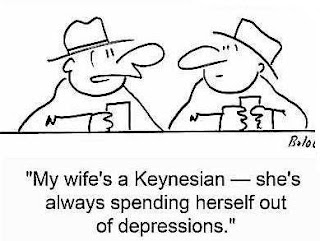
My previous post entitled "
Inflation 'Documentary' Lacks Evidence" received an excellent comment from TJ. His comment has motivated me to flush out more of my thinking and respond to his counter points. Thanks TJ, I appreciate your input!
I agree with about 1/2 of the bullets and disagree with the rest. You are correct that the video should give more evidence. One of several bullets I disagree with is Soc Sec. It is a generational Ponzi scheme where those who got in early had pretty good benefits and today it is not sustainable. The number of workers supporting each retirees has greatly shrunk. Soc Sec today is broke - they have to supplement the SS taxes collected to have sufficient payouts. This will get worse. Medicare is in even worse condition.
The problem with social security is the unforeseen possibility of a drastic reduction in the sheer numbers in successive generations. The baby boomers were our largest generation and successive generations, X, Y & Z, were smaller in number. This clearly creates a major structural challenge to a program based on transfer payments. Adding the disabled, children with deceased parents, raising benefits, etc. have all contributed to the higher necessary input payments. I suppose my argument is one of semantics, it's just not a literal Ponzi scheme but it certainly does have plenty of structural problems that need to be resolved. I see no way around it becoming a needs-based program and I am certainly not counting on it for my retirement.
On "higher taxes will lead to less tax revenue" - this is true at some level of tax rate. Don't you recall when the income tax was reduced it generated more revenues? Again at some point of reduced taxes it would not bring additional revenue.
Yep, it's true of some level of taxes will not lead to greater revenue and the opposite is true as well. I just hate the use of absolutes in a claim like the one they made. Yes, Reagan's reduction in tax rates resulted in higher revenues, no argument there. But, looking at tax rates, we are at
historic lows for top tax rates and it seems inevitable that these rates will need to rise in the foreseeable future.
"Of course this comes with consequences down the line but the intention is that it will not be as bad as allowing a total collapse. These are lessons we learned in the Great Depression........." You sound like a believer in Keynesian economics. Keynesian economics will not work forever and it will surely fall someday - maybe sooner than later.
I'm not a believer in many interpretations of Keynesian economics. I see the government's role as "lender/employer/demand of last resort" as extremely important in times of complete meltdown. I do not believe in the interpretation of Keynesianism that motivated times such as Johnson's Great Society. I do not think the government is the best allocator of capital during good times, I think that role is best left to the free market.
But, I traded equities on Wall Street from the height of the market in 2007 and through the 2008 crash. I witnessed first-hand the complete panic that beset investors. Without government intervention I truly believe the entire financial system would have collapsed. I see no way Merrill Lynch, Morgan Stanley, Goldman Sachs, Citigroup, Bank of America, General Electric and many others would have survived if no actions were taken after Lehman went bankrupt. The expansion of deposit insurance, guarantee of commercial paper, TARP capital injections, etc. were absolutely crucial stabilizing mechanisms for the system. When the entire world wanted to deleverage at the same time, the only entity capable of leveraging up as demand of last resort was the US government.
I agree this level of involvement must decline over time but remember that Keynes was primarily interested in saving the free market system during times of great stress so that its potential could be unleashed again in better times. This recession necessitated the use of Keynes' prescriptions as it has been a massive demand side contraction, much like the Great Depression and Japan's lost decade.
Have you noticed the destruction of the dollar since the depression? Prior to the depression gold was relatively stable - a good monetary medium. Gold's long term trend since it was $30/ounce has skyrocketed.
Well, this is a very complicated issue and I'm not sure it lends itself to simple interpretations like the dollar got killed and gold has skyrocketed implying our mistakes. Since leaving the gold standard, the price of gold has exploded quite rapidly. But, for a commodity in demand with fixed supply, this isn't all that surprising. While the gold standard did enforce monetary discipline to some degree it had become a major hindrance for a massive economy like the US.
The value of currencies are largely relative. The dollar's decline is also largely a result of the creation and strengthening of the monetary union in Europe with the euro representing now over 50% of the DXY index. After WWII the only dominate economy was the United States and we greatly benefited from this as the "last man standing". But, over time Japan has rebounded to become a global economic power and Europe has completely recovered and grown becoming a fully functioning, integrated force in the global picture. Much stronger economies around the world have only worked to improve all our standards of living even while they have developed into very capable competitors to the US.
"there is no need to not have any debt as long as we can service this debt over time. It may be very useful for us to accumulate debt during difficult times and work to pay it off in better times..................As long as a country can produce more than $1 for every $1 it spends to service its debt, it is entirely logical and intelligent to have debt within reason." The problem IS the debt level is unreasonable. When you say to service the debt, it sounds like paying interest on the debt. Of course the GDP is higher than annual interest on the debt. The annual interest per citizen is $2100 and growing rapidly. How can this be sustainable and this is just the interest on the debt - let alone welfare and defense spending.
The national gross debt is 90% of GNP and increasing. With high sustained unemployment the gross debt levels are unsustainable. You seem confident in the current recovery. What recovery? The "perceived" recovery is running out of gas. We probably will see another dose of bailouts - bye bye Keynesianism. Greece is 130% of GNP with blood in the streets.
The borrower is a slave to the lender.
The level of debt is worrisome to be sure. We are walking a fine line but the current circumstances show a still very high level of demand for US Treasuries and interest rates are very low. I don't see interest rates rising substantially until we see a sustained economic recovery which should help us to grow our way out this mess. GDP numbers have been very strong, let's not forget. Yes, we've had massive stimulus and the unemployment situation has not turned the corner yet but it has stabilized.
Ultimately, I am confident in the US economy. I believe we have the greatest economic engine in the world and it releases the incredible innovative human spirit like nothing before it. I see areas in biotechnology, pharmacology and green technology as new waves of the futures. We can still invent and export our ingenuity to the world. Our engine has sputtered but I haven't lost faith yet.
 Stocks rest yesterday after 3.3% jump from Friday's lower open
Stocks rest yesterday after 3.3% jump from Friday's lower open

 Payroll data in line with estimates, still dour
Payroll data in line with estimates, still dour Equity market looks ugly, S&P loses 5.4% for June
Equity market looks ugly, S&P loses 5.4% for June

 Austerity, restoring confidence or killing the patient?
Austerity, restoring confidence or killing the patient?  US World Cup hopes crushed in OT against Ghana
US World Cup hopes crushed in OT against Ghana Businessweek article a bit depressing
Businessweek article a bit depressing Donovan comes through for the US
Donovan comes through for the US China Revaluation
China Revaluation Gold is shaping up for a parabolic move into new all-time highs. US gold futures closed just under previous all-time intraday highs of $1,253.90 for the highest all-time closing price. I am locked and loaded long GLD with an average price of $119.38 and a stop at the $118.80 area. I expect this to be an excellent swing trade as momentum will likely increase dramatically when gold clears previous highs. I will be looking for at least $1,300 to start taking profits. When momentum kicks in, gold has a historical tendency to take off with the excitement.
Gold is shaping up for a parabolic move into new all-time highs. US gold futures closed just under previous all-time intraday highs of $1,253.90 for the highest all-time closing price. I am locked and loaded long GLD with an average price of $119.38 and a stop at the $118.80 area. I expect this to be an excellent swing trade as momentum will likely increase dramatically when gold clears previous highs. I will be looking for at least $1,300 to start taking profits. When momentum kicks in, gold has a historical tendency to take off with the excitement.

 Not the most exciting day of soccer today as Slovakia tied New Zealand 1-1 in the opening match and Portugal and Ivory Coast drew to a 0-0 tie. I must say I was impressed with North Korea's play in the 2:30 time slot against powerhouse and World Cup favorite, Brazil. North Korea held Brazil scoreless well into the second half until their goalkeeper committed the cardinal sin of being beat to the near post on a no-angle shot off the endline. Great vision and a brilliant through ball took Brazil up 2-0. But, North Korea kept on fighting and grabbed one with just minutes to go for a 2-1 finish. The two selfish shots in the final minutes from Jong Tae-Se's aggravated me; how can somebody living under a communist system be so selfish I ask? I'll admit I almost found myself rooting for North Korea, the massive underdog and global pariah. How can one not feel bad when North Korean players admit to seeing cell phones for the first time in their lives? Kim Jong Il will not even allow games to be televised in the country. Yet he will show highlights of the matches. I imagine the purposeful impression being something along the lines of "NK was the best team out there but was cheated out of victory by the capitalist pigs". But it's great to see them on the world stage and I hope this can help slowly erode the barriers of isolation.
Not the most exciting day of soccer today as Slovakia tied New Zealand 1-1 in the opening match and Portugal and Ivory Coast drew to a 0-0 tie. I must say I was impressed with North Korea's play in the 2:30 time slot against powerhouse and World Cup favorite, Brazil. North Korea held Brazil scoreless well into the second half until their goalkeeper committed the cardinal sin of being beat to the near post on a no-angle shot off the endline. Great vision and a brilliant through ball took Brazil up 2-0. But, North Korea kept on fighting and grabbed one with just minutes to go for a 2-1 finish. The two selfish shots in the final minutes from Jong Tae-Se's aggravated me; how can somebody living under a communist system be so selfish I ask? I'll admit I almost found myself rooting for North Korea, the massive underdog and global pariah. How can one not feel bad when North Korean players admit to seeing cell phones for the first time in their lives? Kim Jong Il will not even allow games to be televised in the country. Yet he will show highlights of the matches. I imagine the purposeful impression being something along the lines of "NK was the best team out there but was cheated out of victory by the capitalist pigs". But it's great to see them on the world stage and I hope this can help slowly erode the barriers of isolation.
 Global correlation is the name of the game right now. Besides gold, investors have not been able to find much safety across the world since the beginning of 2010. With cash offering a paltry return, the search for yield is hot yet there is not much to be found so far this year. While portfolio diversification of at least 20 securities is now seen as the basic standard all investors should follow, I am awaiting more academic research into the shift in systemic risk (market-wide risk) versus idiosyncratic risk (risk associated with a particular security) as selling pressure rises in markets. In rising markets, the greatest risk is idiosyncratic in that an investor will carry too much exposure to an individual issue and could suffer should that stock see a black swan event. Yet, in falling markets, the risk seems to shift and systemic risk rises greatly relative to security-specific risks. The benefits of diversification are lost because correlation between stocks, markets and asset classes jumps. Hence, diversification is beneficial as markets rise yet useless when they fall (the time in which you need those benefits most). I have no concrete study to reference on this but would I love to see a finance professor somewhere prove or disprove these observations.
Global correlation is the name of the game right now. Besides gold, investors have not been able to find much safety across the world since the beginning of 2010. With cash offering a paltry return, the search for yield is hot yet there is not much to be found so far this year. While portfolio diversification of at least 20 securities is now seen as the basic standard all investors should follow, I am awaiting more academic research into the shift in systemic risk (market-wide risk) versus idiosyncratic risk (risk associated with a particular security) as selling pressure rises in markets. In rising markets, the greatest risk is idiosyncratic in that an investor will carry too much exposure to an individual issue and could suffer should that stock see a black swan event. Yet, in falling markets, the risk seems to shift and systemic risk rises greatly relative to security-specific risks. The benefits of diversification are lost because correlation between stocks, markets and asset classes jumps. Hence, diversification is beneficial as markets rise yet useless when they fall (the time in which you need those benefits most). I have no concrete study to reference on this but would I love to see a finance professor somewhere prove or disprove these observations. The Dow closed 269 points off its lows yesterday ending down only 23 points for the day. Global markets followed the US lead rebounding last night with nearly every European market up 2-3%. It looks like yesterday could have been a successful retest of the flash crash lows and higher prices are ahead, at least in the short-term. The euro held the lows of the year on a retest yesterday but the struggling currency has yet to mount a sustained bounce off the $1.21 level. US futures are trading up 0.8% at last check pre-market.
The Dow closed 269 points off its lows yesterday ending down only 23 points for the day. Global markets followed the US lead rebounding last night with nearly every European market up 2-3%. It looks like yesterday could have been a successful retest of the flash crash lows and higher prices are ahead, at least in the short-term. The euro held the lows of the year on a retest yesterday but the struggling currency has yet to mount a sustained bounce off the $1.21 level. US futures are trading up 0.8% at last check pre-market. The blogosphere featured some great posts today and while I'm not usually a linkfest type of guy, today's an exception as my CFA studying is overtaking my blog time now that I'm in the home stretch (under two weeks now!). Below are the particular pieces I found intriguing with the link for your further reading pleasure.
The blogosphere featured some great posts today and while I'm not usually a linkfest type of guy, today's an exception as my CFA studying is overtaking my blog time now that I'm in the home stretch (under two weeks now!). Below are the particular pieces I found intriguing with the link for your further reading pleasure. Distinguished financial academic and Nobel Laureate, Robert Merton,
Distinguished financial academic and Nobel Laureate, Robert Merton,  My previous post entitled "
My previous post entitled " The euro is still in freefall hitting new lows of $1.2143 so far this evening. German Chancellor Angela Merkel announced today a ban of naked short-selling on the stocks of 10 major financial institutions and a ban of credit default swaps purchases on German government debt by speculators until March 31, 2011. This action is seemingly unneeded as the German DAX is up 0.8% year-to-date and yields on 10-year sovereign bonds are a mild 2.83%. Naked shorting of equities should be illegal to begin with; it's against regulations in the United States and many other markets. The CDS ban is on transactions by traders that do not own the underlying and therefore do not qualify as hedgers. Yet, most of the speculative CDS purchases occur in London and fall outside the jurisdiction of the German government so the ban is largely ineffective. (
The euro is still in freefall hitting new lows of $1.2143 so far this evening. German Chancellor Angela Merkel announced today a ban of naked short-selling on the stocks of 10 major financial institutions and a ban of credit default swaps purchases on German government debt by speculators until March 31, 2011. This action is seemingly unneeded as the German DAX is up 0.8% year-to-date and yields on 10-year sovereign bonds are a mild 2.83%. Naked shorting of equities should be illegal to begin with; it's against regulations in the United States and many other markets. The CDS ban is on transactions by traders that do not own the underlying and therefore do not qualify as hedgers. Yet, most of the speculative CDS purchases occur in London and fall outside the jurisdiction of the German government so the ban is largely ineffective. ( Traders on hopping on the euro slide! Following the significant weakness in the euro last week the Eurozone's currency hit new lows of $1.2233 last night. There seems to be no end to the pervasive doubts over the European Union's chances of success with its debt package. Overall pessimism about the fate of the monetary union reigns supreme. While I am definitely not considering an attempt at catching this falling knife, I do see a short-covering rally possibility as short positions in the currency reach record highs and sentiment is extremely bearish. Other notable news, the Shanghai Composite tumbled 5.1% last night as the prospect of central bank tightening pressures equity prices. While the PBOC's actions are likely correct for the long-term health of the country, equities will suffer.
Traders on hopping on the euro slide! Following the significant weakness in the euro last week the Eurozone's currency hit new lows of $1.2233 last night. There seems to be no end to the pervasive doubts over the European Union's chances of success with its debt package. Overall pessimism about the fate of the monetary union reigns supreme. While I am definitely not considering an attempt at catching this falling knife, I do see a short-covering rally possibility as short positions in the currency reach record highs and sentiment is extremely bearish. Other notable news, the Shanghai Composite tumbled 5.1% last night as the prospect of central bank tightening pressures equity prices. While the PBOC's actions are likely correct for the long-term health of the country, equities will suffer.
 London is trading down nearly 1.8%, Spain 3.8% and Italy 3.3% as investors became skittish after Spain's core inflation data turned negative and the euro continued to tumble. The inflation data casts doubt on Spain's ability to grow its way out of its debt obligations while struggling with >20% unemployment.
London is trading down nearly 1.8%, Spain 3.8% and Italy 3.3% as investors became skittish after Spain's core inflation data turned negative and the euro continued to tumble. The inflation data casts doubt on Spain's ability to grow its way out of its debt obligations while struggling with >20% unemployment. 
